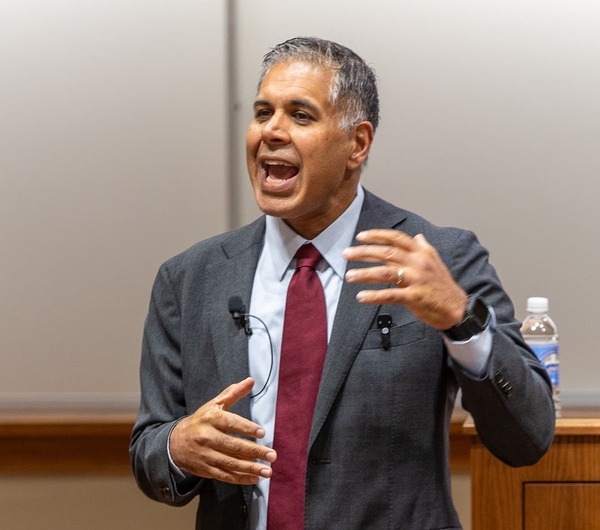
On August 29th, the CCCG hosted Judge Amul Thapar of the United States Court of Appeals for the Sixth Circuit for a talk on his new book, The People's Justice: Clarence Thomas and the Constitutional Stories that Define Him, following a private breakfast with the Center’s Tocqueville Fellows and several law students.
Judge Thapar is a former United States district judge of the United States District Court for the Eastern District of Kentucky and former United States Attorney for the Eastern District of Kentucky. Last year, along with Professor Muñoz, Judge Thapar taught a one-credit course titled “Church, State, and the American Supreme Court.” This fall, Thapar and Muñoz are again co-teaching a course, “Race and the American Constitution,” which covers the recent Students for Fair Admissions v. Harvard case.
Ella Cain, Tocqueville Fellow and Constitutional Studies minor, introduced Thapar at the breakfast, expressing thanks for his generosity in sharing his knowledge and time with the students at Notre Dame, and specifically for allowing her to help with his book as a research assistant last year. “Despite only knowing me for a short time, Judge Thapar took a chance and trusted me to help him on his most precious project. … He has been and continues to be so kind and generous with myself and the students of Notre Dame who admire him and his work so much,” Cain said.
Starting the talk with a line from Justice Scalia, “As judges, lawyers, and academics, we have an obligation to fly the flag of originalism,” Thapar refuted many of the criticisms of Justice Thomas’ jurisprudence and explained why originalism, at its core, almost always favors the weak over the strong. “It makes sense, because the document, the Constitution, our laws, are written to protect us from predatory individuals, predatory government, [and] predatory corporations,” Thapar said.
“I thought the best way to explain what an originalist America would look like was to explain [Justice Thomas’] separate writings. And I found something … through studying his jurisprudence: Justice Thomas cares passionately about people. He’s first and foremost an originalist, but second, he cares a lot about people, and that is often lost – hence the name, The People’s Justice.”
The People’s Justice covers 12 cases in which Justice Thomas writes separately from the opinion of the court and tells the real stories of the litigants in those cases. At the talk, Thapar outlined three of the cases his book covers: Kelo vs. City of New London (1978), Mckee v. Cosby (2019), and City of Chicago v. Morales (1999).
Thapar explained how these cases depict three key characteristics of Thomas: he is a pure originalist, he cares passionately about the people in front of him, and he has a strong black voice.
Beginning with Kelo vs. City of New London, Thapar told the story of Susette Kelo, a paramedic and mother of five whose life’s dream was to retire to a small house in New London with a view of the water. When the city took possession of her house to clear the way for the Pfizer corporation, the case went all the way to the Supreme Court. Kelo lost. In his dissent, Thomas was the only justice who advocated a return to the original meaning of eminent domain – “public use” instead of “public purpose.” Thapar said one of the greatest lines that proves Thomas’ championing of the poor and minorities is contained in this case: “the American people are safe in their houses, but their houses themselves are not safe.”
Both Mckee v. Cosby, a defamation case, and City of Chicago v. Morales, a criminal law case, tell a similar story of Thomas’ jurisprudence seeking to protect the vulnerable. Luke Thompson, a senior Tocqueville Fellow, said, “Judge Thapar’s lecture did an excellent job of building a thread between Justice Thomas’ opinions in both landmark and lesser-known cases to demonstrate the justice’s underlying jurisprudence of simply applying the Constitution’s protections to defend the little man.” The stories of Kathy McKee and Devin McGregor are just some of the examples showing how, according to Thapar, “Justice Thomas never forgets that the case involves real people, not just legal principles.” He continued, “Some of those people are struggling in some of the hardest circumstances imaginable. He often speaks directly to those people.”
Hadiah Mabry, a second-year law student at the University of Notre Dame Law School, said: “Judge Thapar is an excellent storyteller. I appreciated hearing about famous cases through the eyes of the individuals directly affected by court rulings. Not only do I know more about the law, but I have a new appreciation for Justice Thomas's jurisprudence.”
In his concluding remarks, Thapar returned to his defense of Thomas and originalist principles: “[Originalism] favors the document, the document reflects the will, those words have meaning and consequence, and it often protects the ordinary citizen and the little person.”
Article contributed by CCCG Writing Fellow Merlot Fogarty.